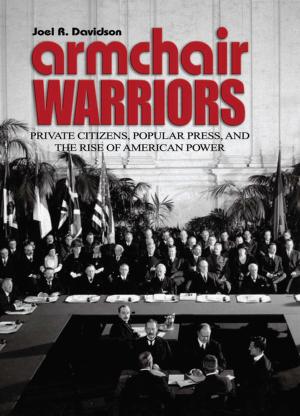In the Shadow of the Alabama
The British Foreign Office and the American Civil War
Nonfiction, History, Military, Naval| Author: | Long | ISBN: | 9781612518374 |
| Publisher: | Naval Institute Press | Publication: | August 15, 2017 |
| Imprint: | Naval Institute Press | Language: | English |
| Author: | Long |
| ISBN: | 9781612518374 |
| Publisher: | Naval Institute Press |
| Publication: | August 15, 2017 |
| Imprint: | Naval Institute Press |
| Language: | English |
This book looks at an allegation of betrayal made against a young Foreign Office clerk, Victor Buckley, who, it was claimed, leaked privileged information to agents of the Southern States during the American Civil War. As a consequence, the CSS Alabama narrowly escaped seizure by the British Government and proceeded to wage war on American shipping. Victor Buckley’s background is examined against the hitherto erroneous belief that he was an insignificant member of the Foreign Office staff.
The American minister Charles Francis Adams oversees a network of spies endeavoring to prove contravention of The Foreign Enlistment Act. The South’s agents, Captain James D. Bulloch and Major Caleb Huse, are the prime targets, and a battle of wits ensues as Bulloch oversees construction of his ships on Merseyside.
A member of a prominent City family offers to enlist the help of a relative who, he claims, holds a confidential position in the Foreign Office. The Confederate agents are soon receiving information about the status of Anglo-American diplomacy and are able to outwit the Union spies and dispatch arms and supplies to the South. Their coup d'état is achieved with the arrival of a message that hurries the Confederate’s most formidable warship out of British waters.
After the escape of the Alabama, the Government moves to curtail Bulloch’s operations. When the war ends in 1865, investigations begin into the circumstances surrounding the Alabama’s departure. As America demands reparation, evidence apparently incriminating Victor Buckley is acquired, but before the claim reaches its hearing in Geneva, diplomatic moves (some involving Anglo-American Masonic influence) result in a treaty and ensure that no allegation is made against any individual member of Foreign Office staff. Queen Victoria, anxious to see the Alabama Claims settled, is spared embarrassment.
A scandal erupts in the Foreign Office in 1878 as a freelance clerk, Charles Marvin, leaks sensitive information to the press and subsequently writes of his experiences, revealing much of the ethos of the office pertinent to Buckley’s story. The writer Arthur Conan Doyle becomes fascinated by Anglo-American diplomacy and the Alabama question, and, soon after joining a London gentlemen’s club where Buckley’s alleged contact is a member, writes a Sherlock Holmes story involving a Foreign Office clerk’s apparent betrayal.
For historians, it is important to know that the book explores the mindset of the Foreign Office during the American Civil War and prior to the Geneva Arbitration in greater depth than has been achieved before.
It addresses previously unsolved mysteries that have puzzled historians for over 150 years and reveals the truth behind the success of Confederate naval activities in Britain. Consequently, it challenges some of the perceived views of the events that have been repeated in successive generations of books on the subject.
For the general reader, it should be shown that the book provides an insight into nineteenth century Anglo-American politics, the subtleties of the British class system, and the fragile relationship between Britain and the United States at that time, each still conscious of their fractured past. In solving the stubbornly elusive mysteries surrounding the infamous CSS Alabama it shows how close Britain and America came to war, and how the resolution gave rise to the Special Relationship.’
This book looks at an allegation of betrayal made against a young Foreign Office clerk, Victor Buckley, who, it was claimed, leaked privileged information to agents of the Southern States during the American Civil War. As a consequence, the CSS Alabama narrowly escaped seizure by the British Government and proceeded to wage war on American shipping. Victor Buckley’s background is examined against the hitherto erroneous belief that he was an insignificant member of the Foreign Office staff.
The American minister Charles Francis Adams oversees a network of spies endeavoring to prove contravention of The Foreign Enlistment Act. The South’s agents, Captain James D. Bulloch and Major Caleb Huse, are the prime targets, and a battle of wits ensues as Bulloch oversees construction of his ships on Merseyside.
A member of a prominent City family offers to enlist the help of a relative who, he claims, holds a confidential position in the Foreign Office. The Confederate agents are soon receiving information about the status of Anglo-American diplomacy and are able to outwit the Union spies and dispatch arms and supplies to the South. Their coup d'état is achieved with the arrival of a message that hurries the Confederate’s most formidable warship out of British waters.
After the escape of the Alabama, the Government moves to curtail Bulloch’s operations. When the war ends in 1865, investigations begin into the circumstances surrounding the Alabama’s departure. As America demands reparation, evidence apparently incriminating Victor Buckley is acquired, but before the claim reaches its hearing in Geneva, diplomatic moves (some involving Anglo-American Masonic influence) result in a treaty and ensure that no allegation is made against any individual member of Foreign Office staff. Queen Victoria, anxious to see the Alabama Claims settled, is spared embarrassment.
A scandal erupts in the Foreign Office in 1878 as a freelance clerk, Charles Marvin, leaks sensitive information to the press and subsequently writes of his experiences, revealing much of the ethos of the office pertinent to Buckley’s story. The writer Arthur Conan Doyle becomes fascinated by Anglo-American diplomacy and the Alabama question, and, soon after joining a London gentlemen’s club where Buckley’s alleged contact is a member, writes a Sherlock Holmes story involving a Foreign Office clerk’s apparent betrayal.
For historians, it is important to know that the book explores the mindset of the Foreign Office during the American Civil War and prior to the Geneva Arbitration in greater depth than has been achieved before.
It addresses previously unsolved mysteries that have puzzled historians for over 150 years and reveals the truth behind the success of Confederate naval activities in Britain. Consequently, it challenges some of the perceived views of the events that have been repeated in successive generations of books on the subject.
For the general reader, it should be shown that the book provides an insight into nineteenth century Anglo-American politics, the subtleties of the British class system, and the fragile relationship between Britain and the United States at that time, each still conscious of their fractured past. In solving the stubbornly elusive mysteries surrounding the infamous CSS Alabama it shows how close Britain and America came to war, and how the resolution gave rise to the Special Relationship.’















